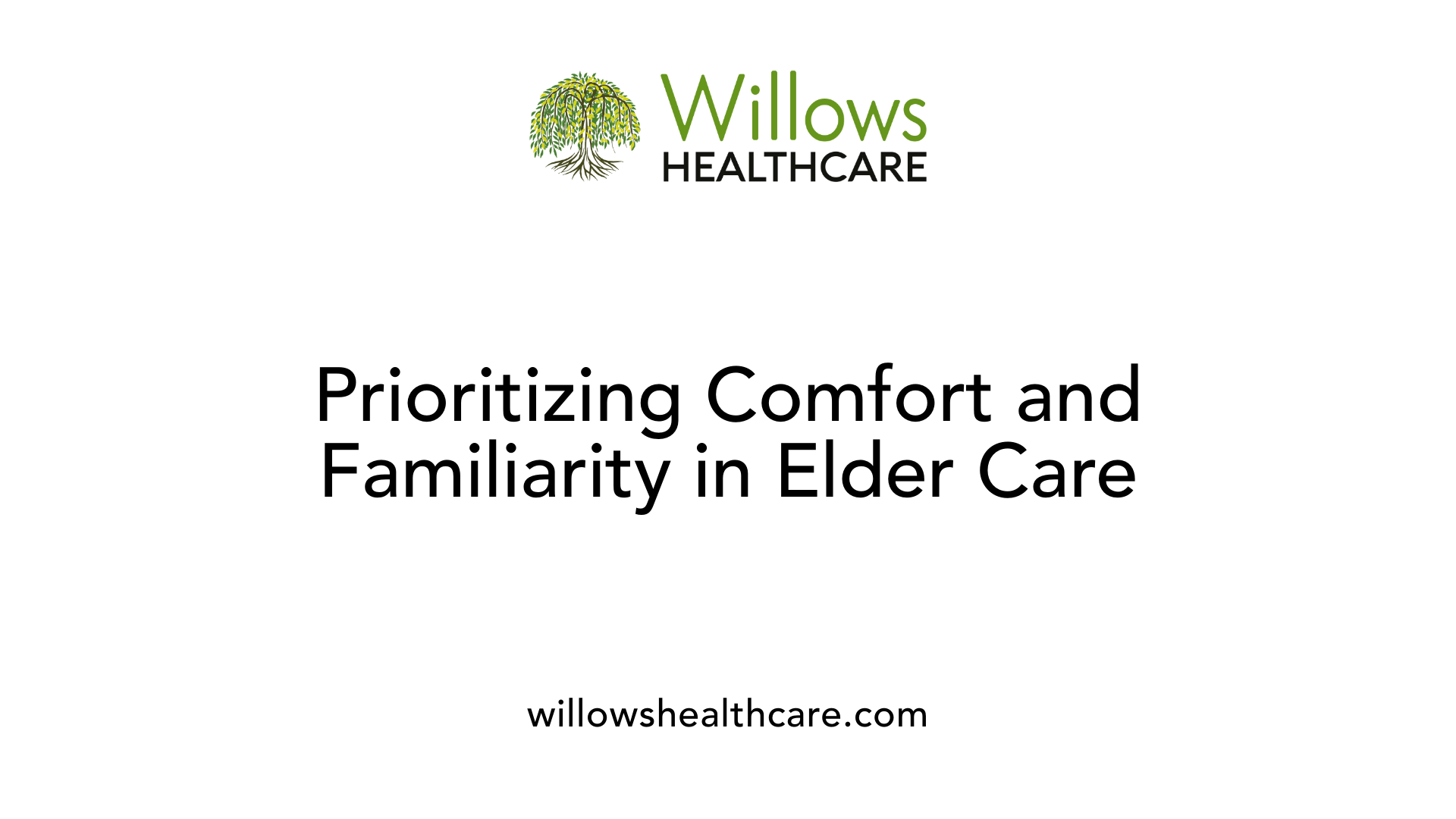Why Willows Healthcare’s Specialized Care Is Essential for Aging in Place
July 16, 2025
Supporting Seniors with Personalized and Community-Based Healthcare


Understanding the Critical Role of Specialized Care in Aging in Place
As the global population ages, the need for comprehensive, tailored healthcare solutions that enable seniors to live independently in their familiar environments has become increasingly vital. Willows Healthcare exemplifies this approach by offering specialized services designed to support aging in place, ensuring safety, dignity, and well-being for older adults within their communities.
The Importance of Aging in Place for Elder Well-Being

Why is aging in place beneficial for seniors?
Aging in place offers a multitude of advantages that significantly contribute to an older adult's quality of life. It allows seniors to remain in their own homes, maintaining the independence and control that are vital to their dignity and self-esteem. Staying in a familiar environment helps preserve emotional stability and mental health, reducing feelings of loneliness and stress that can occur in unfamiliar or institutional settings.
Research shows that living in one’s community can improve physical and cognitive health. It enables seniors to continue participating in social activities, community programs, and intergenerational interactions that keep their minds active and bodies healthy. Plus, it is often more cost-effective than relocating to assisted living or nursing homes, especially when tailored home care services like medication management, meal delivery, and assistance with daily tasks are available.
Furthermore, aging in place allows for personalized care plans that meet individual health needs. Access to specialized home care services, including dementia care and post-surgery recovery, supports safety and well-being. Family involvement is also enhanced, with flexible visiting hours and collaborative planning helping loved ones stay engaged in their relatives’ care.
Overall, aging in place supports seniors in maintaining their independence, social connections, and emotional wellness, making it a practical and compassionate choice for many.
The Role of Healthcare in Supporting Senior Independence

Why is healthcare important for the elderly?
Healthcare is fundamental for older adults because it addresses the growing and complex health needs that come with aging. As seniors age, they often experience chronic conditions such as dementia, arthritis, heart disease, and diabetes. Effective healthcare management helps control these conditions, minimizing complications and enhancing daily functioning.
Early detection is crucial. Regular screenings and preventative strategies can identify health issues before they become severe, allowing for timely treatment and better outcomes. For example, fall prevention programs and health promotion initiatives like managing chronic diseases contribute significantly to maintaining independence and safety.
Addressing social factors affecting health is equally essential. Social determinants such as socioeconomic status, social connections, transportation access, and safe living environments influence health outcomes. For instance, seniors with limited mobility or financial resources may struggle to access medical care or nutritious food, impacting overall well-being.
Healthcare services tailored to seniors include management of medications, wound care, physical therapy, and specialized support for conditions like Alzheimer’s or post-surgery recovery. Community-based programs offer home modifications, transportation assistance, and nutritional support, all designed to promote healthy aging.
In summary, healthcare plays a vital role by managing chronic illnesses, emphasizing preventive care, and addressing social factors. These efforts help seniors maintain their independence, enjoy improved quality of life, and stay actively involved in their communities.
| Aspect | Focus | Additional Details |
|---|---|---|
| Chronic Condition Management | Monitor and treat ongoing health issues | Includes services like medication management, home health care, and specialized therapies |
| Prevention Strategies | Reduce risk and catch early signs | Regular screenings, fall prevention, health education, and immunizations |
| Social Determinants of Health | Eliminate barriers to care | Transportation, affordability, social support, safe environments |
Through comprehensive healthcare approaches, seniors can age in place comfortably, safely, and with dignity.
Specialized Elder Care as a Pillar of Independent Living

How does specialized elder care support independent living for seniors?
Specialized elder care plays a critical role in helping seniors maintain their independence by offering personalized assistance that aligns with their unique health and lifestyle needs. Care plans are carefully tailored to address conditions such as dementia, Alzheimer’s, or recovery from surgery, ensuring that each individual receives appropriate support to manage daily routines effectively.
Safety within the home is paramount. Elder care services often include home safety modifications such as installing grab bars, improving lighting, and removing trip hazards. These updates significantly reduce the risk of falls and accidents, creating a secure environment for aging in place.
Beyond individual care, coordination with community resources enhances support. Programs like home health care, meal delivery, transportation, and financial management help seniors navigate daily life while maintaining their autonomy. Community engagement activities and social programs foster connections, reducing feelings of loneliness and social isolation.
The infrastructure of aging-friendly communities, including skilled nursing and assisted living options, alongside home care services, ensures that seniors can adapt seamlessly as their needs evolve. Health management services, such as medication assistance, wound care, and physical therapy, can be delivered at home or in community centers, facilitating ongoing independence.
Moreover, technological solutions like emergency medical alert systems bolster safety, providing seniors with instant assistance during emergencies. Support from geriatric care managers and family caregiver services also aid in planning future care, reducing stress for families and promoting peace of mind.
Overall, comprehensive elder care that integrates personalized health management, safety measures, and community resources empowers seniors to remain active, healthy, and independent in their own homes for as long as possible.
Community-Based and Innovative Care Models Enhancing Aging in Place

What is the role of community-based and innovative care models for seniors?
Care models rooted in the community are essential for helping seniors live independently in their own homes. These models focus on providing customized, comprehensive support that addresses various aspects of daily living, health, and safety.
One of the primary goals is to enable seniors to stay in familiar environments, which research shows can improve emotional well-being, reduce stress, and combat loneliness. To do this, services like home modifications—such as installing grab bars or ramps—and maintaining mobility with assistive devices are crucial.
In-home support services include healthcare, personal care, medication management, and assistance with daily chores. These services are designed to be flexible, often supplemented by volunteer programs or community resources like meal delivery and transportation options, which facilitate access to healthcare and errands.
Community infrastructure and social programs play a vital role in supporting socialization and community involvement. Initiatives like intergenerational activities or community centers help older adults stay connected, fostering a sense of purpose and belonging.
Advances in gerontology and care models are driven by ongoing research and education. Institutions such as the USC Leonard Davis School of Gerontology are at the forefront, developing innovative care approaches that combine health technology, social support, and personalized planning.
The integration of these elements results in a holistic care ecosystem that promotes independence, dignity, and safety. Technology such as emergency medical alert systems and remote health monitoring enhance safety, while community and health services work together to create a seamless support network.
Overall, community-based models and innovative care solutions form the backbone of aging in place strategies, ensuring older adults can enjoy a high quality of life in their own homes, with the confidence of comprehensive and compassionate support.
Specialized Care Providers and High-Quality, Individualized Support

What role do specialized care providers play in enabling aging in place?
Specialized care providers are crucial in helping seniors live independently in their own homes. They offer a range of tailored health services that go beyond basic support, including in-home medical care, management of chronic conditions like diabetes, and preventive health interventions. These professionals conduct home safety assessments to reduce fall risks and assist with daily activities such as bathing, grooming, and medication management.
They also coordinate with primary care doctors and community resources to ensure comprehensive healthcare coverage. Technology plays a part too, with remote monitoring and telehealth services that enable prompt response to health concerns and early detection of potential issues.
Beyond physical health, these providers address emotional and social needs by offering mental health support and companionship. This holistic approach helps seniors feel connected, safe, and supported, maintaining not just their health but also their dignity and quality of life.
By working seamlessly within integrated care systems, specialized providers foster a safe and effective environment that promotes independence. They help seniors stay in their homes longer, reducing the need for more restrictive and often expensive care facilities.
| Service Focus | Description | Additional Details |
|---|---|---|
| Medical Care | Home visits, chronic disease management, medications | Includes telehealth and remote monitoring |
| Safety & Assistance | Home safety evaluations, daily activity support | Helps prevent falls and injuries |
| Emotional Support | Counseling, companionship, mental health services | Reduces social isolation |
| Care Coordination | Collaboration with healthcare providers | Ensures comprehensive, continuous care |
This personalized, community-centered support model not only boosts physical well-being but also enhances mental health and independence among elders, enabling many to enjoy their golden years in comfort and familiarity.
A Collective Effort to Support Aging in Place
Supporting aging in place requires a multifaceted approach combining specialized healthcare, community initiatives, and personalized services that address physical, mental, and social needs. Willows Healthcare exemplifies this comprehensive model by offering specialized, high-quality care that empowers seniors to live independently in their own homes. Through personalized care plans, innovative community models, and dedicated care providers, older adults can enjoy a safe, dignified, and fulfilling retirement within their familiar environments. As society continues to prioritize aging in place, collaboration among healthcare providers, community organizations, and families will be essential to creating sustainable, supportive environments for our aging population.
References
- The Benefits of Aging in Place: Why Home Care is the Best Option ...
- Aging in Place Campus
- The Willows at Westborough - Independent Senior Living
- Services for Older Adults Living at Home | National Institute on Aging
- Decision Guide | Wesley Willows & Peterson Meadows | Rockford, IL
- Programs & Services - Consumer - California Department of Aging
- Social Determinants of Health and Older Adults | odphp.health.gov
- Healthy Aging | odphp.health.gov













